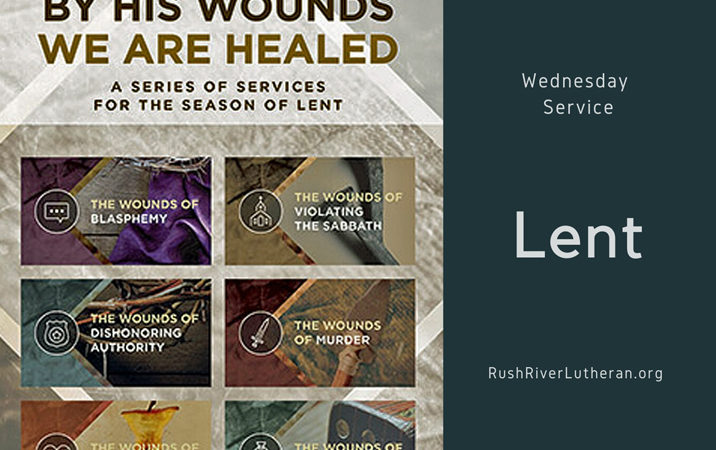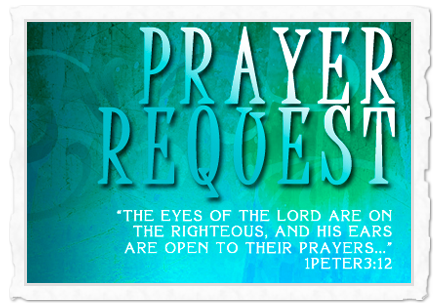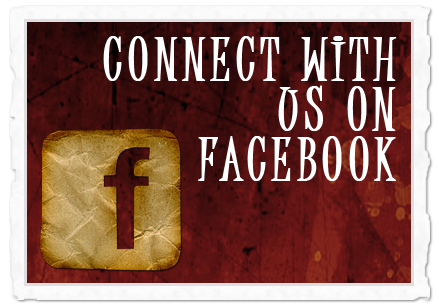A Series of Services for the Season of Lent
Week 5: The Wounds of Stealing
In this service, we remember that the wounds of stealing and dishonesty we committed against our Lord were laid on Christ on the cross. Here, Jesus is accused of forbidding the paying of taxes. Our Lenten observance reminds us that though we have been brought low by sin, our Lord will bless us with new life in him through the cross.
Order of Service
P In the name of the Father, and of the + Son, and of the Holy Spirit.
C Amen.
P By a perversion of justice, Christ was taken away.
C Who could have imagined his future?
P For he was cut off from the land of the living,
C stricken for the transgression of God’s people.
P Christ was wounded for our transgressions,
C crushed for our iniquities;
P upon him was the punishment that made us whole,
C and by his wounds we are healed.
Confession and Forgiveness
P Let us confess our sin in the presence of God and of one another.
C Most merciful God, we confess to you that we have broken your commandments by our own thoughts, words, and deeds. We have stolen from you in our failure to love, serve, and obey you. We have not loved our brothers and sisters as we ought, and we have not cared for your creation. For the sake of your Son, Jesus Christ, have mercy on us, and give us the healing power of your love that we may walk again in your ways and live to the glory of your holy name. Amen.
P God is gracious and merciful, and desires that we be made free of the burden of our sins. Through Jesus Christ, who bore the cross for our sake and for the sake of the whole world, there is healing, hope, and life. Your sins are forgiven in the name of the Father, and of the + Son, and of the Holy Spirit.
C Amen.
Readings
Old Testament Reading from Exodus 20:15
You shall not steal.
Epistle Reading from Romans 13:1-7
Let every person be subject to the governing authorities; for there is no authority except from God, and those authorities that exist have been instituted by God. Therefore, whoever resists authority resists what God has appointed, and those who resist will incur judgement. For rulers are not a terror to good conduct, but to bad. Do you wish to have no fear of the authority? Then do what is good, and you will receive its approval; for it is God’s servant for your good. But if you do what is wrong, you should be afraid, for the authority does not bear the sword in vain! It is the servant of God to execute wrath on the wrongdoer. Therefore, one must be subject, not only because of wrath but also because of conscience. For the same reason you also pay taxes, for the authorities are God’s servants, busy with this very thing. Pay to all what is due to them—taxes to whom taxes are due, revenue to whom revenue is due, respect to whom respect is due, honor to whom honor is due.
Gospel Reading from Luke 23:1-5
Then the assembly rose as a body and brought Jesus before Pilate. They began to accuse him, saying, “We found this man perverting our nation, forbidding us to pay taxes to the emperor, and saying that he himself is the Messiah, a king.” Then Pilate asked him, “Are you the king of the Jews?” He answered, “You say so.” Then Pilate said to the chief priests and the crowds, “I find no basis for an accusation against this man.” But they were insistent and said, “He stirs up the people by teaching throughout all Judea, from Galilee where he began even to this place.”
Children’s Message
(read to your children – please improvise as needed!)
Can I tell you a story? Once my oldest son got really mad at his younger brother. The younger brother was always going into his room and picking up one of the older brother’s toys. Has that ever happened to you? (Listen for answers.) Anyway, the older son cried out to me, “Dad, my brother just stole this from me!” So, I sat both of the boys down together, and we had a little talk. I talked to them about what it means to be brothers. To be brothers means to care for one another and to respect one another. And, yes, that means respecting each other’s things, but more importantly, to respect each other as people whom God very deeply loves. God is the source and giver of all gifts, even everything we have. In sending Jesus, God didn’t seek to keep the riches of the kingdom locked up in heaven, but to give them away—even in giving his Son for us all.
Let us pray. Lord God, help us to be people who see all other people as our brothers and sisters in this world in need of your love and care. Amen.
Sermon
The commandment that prohibits stealing addresses more than the matter of our paying taxes. The commandment encourages us to look out for our neighbors and their welfare through love and justice on their behalf.
The false charge against Jesus that he forbade the payment of taxes to the emperor was only an attempt by dishonest spies who sought to trap Jesus. At the trial of Jesus before Pilate they would try to use this incident as an attempt to make Jesus out to be a revolutionary figure. But Jesus silenced their craftiness by saying to them, “Give to the emperor the things that are the emperor’s, and to God the things that are God’s” (Luke 20:25).
Jesus did not steal, but his mission was certainly revolutionary. Yet his calling us to give “to God the things that are God’s” is at least partially an indictment for all the ways in which we have stolen from God.
In the culture in which we live, stealing is more and more becoming a common-day occurrence. People today have not only to be protected from being taken advantage of for what are truly their possessions, but even to have their own identity protected. Entitlement, greed, selfishness, and unequal wealth distribution reign supreme among the “haves,” while the “have nots” among the poor and hungry continue to go without. It is not hard to find evidence for all the ways people look out only for themselves, and at the same time take advantage of their neighbors. That is what stealing is: taking advantage of others, acquiring from others by unjust means. The just judgment for this would be more than we could ever bear.
Jesus took his place in the middle of two thieves, himself crucified as a criminal. True, he did not steal, and he did not commit a crime. But he suffered as one who did. He suffered and died for us. The very heart of God is wounded in the death of Jesus for the sins of the world. But by his wounds, we are healed.
The healing that God brings to us through Christ frees our hearts and our lives from judgment. We trust that because of Jesus we are no longer regarded as the criminals with whom Jesus associated even in death but as children of the heavenly Father, graced deeply and daily by God’s love.
In the parable of the prodigal son (Luke 15), the son who sought his father’s inheritance essentially wished his father to be dead so that he could take his portion and live on his own. As we know from the parable, that plan didn’t work out very well for the son. The son comes home with a sense of his wrongdoing, his theft from the father’s good graces. But the father is extravagant in grace upon the son’s return, running to him and embracing him, and throwing a feast in his honor. The elder son knew this younger son only as a thief of the father’s property. His heart was cold to both the merciful father and the son who was welcomed home. But even though this elder son is without mercy, the father has an abundance. God welcomes home all of us who are thieves and criminals, living in ways that are contrary to his will. We all get to come home in mercy that does not leave us in the judgment of death. This mercy reaches out to the elder son as well, seeking to melt his cold heart with the mercy of God’s abundant gifts.
The healing of Jesus’ wounds empowers us to be agents of love for our neighbors. We get to take our place with them, among them, for their good and for their well-being. We get to look out for our neighbors, trusting that God is doing all the looking out for us. Instead of looking over our shoulder, we can be people using the head on our shoulders to imagine ways of greater giving and goodness for others. As Jesus would say in his Sermon on the Mount, “Do not resist an evildoer,” but “give to everyone who begs from you, and do not refuse anyone who wants to borrow from you” (Matthew 5:39-42). We are givers because of the gift we have received in Jesus.
Near the end of the gospel of Matthew, we hear a parable about the sheep and the goats (chapter 25). The goats are those who have spent their lives butting out others from the trough, seeking to get to the head of the line, and not caring all that much about the poor sheep they have butted out of the way or trampled underfoot. The sheep, on the other hand, have looked out for all others—yes, the sheep, but even the goats!—o provide for their neighbors as needs arise. The parable is not meant for us to reduce its meaning to sheer moralism. It is a parable of faith. Those who trust in Jesus live and move like “little Christs” in the world caring for the many needs of people. They see their neighbors as important, treasures in God’s eyes, creatures and children of the one God who has given them to us to love.
This sharing of love, even at the cost of personal wounds to us, is the giving “to God the things that are God’s.” Jesus did this for us. We get to live as the ambassadors of his love for others.
Offering
Please consider making your offering online at https://rushriverlutheran.org/give/
Prayers of the People
P Let us pray for the Church, for all in need, and for the whole of God’s creation. That throughout these forty days of Lent, you may give your people hope that it is Jesus, our Lord, who leads the way and takes into his body on the cross the sins of the whole world.
C Heal us, O God.
P For all that you provide us in this life and for all that you provide for all people everywhere, that we may put away envy and be grateful for your gifts.
C Heal us, O God.
P That we may recognize those in need, especially the hungry and the poor, pray for them, work for change in government for their good, and seek to uphold them from the resources of our own charity.
C Heal us, O God.
P That those who are sick or suffering may be blessed with better health and wholeness.
C Heal us, O God.
P For those who are dying, that, leaving all their earthly things behind, they may come to embrace the greater treasures in your eternal presence.
C Heal us, O God.
P Into your healing, wounded hands for our sake, we commend all for whom we pray.
C By Christ’s wounds, we are healed. Amen.
The Lord’s Prayer
Our Father, who art in heaven,
hallowed be thy name,
thy kingdom come,
thy will be done,
on earth as it is in heaven.
Give us this day our daily bread;
and forgive us our trespasses,
as we forgive those
who trespass against us;
and lead us not into temptation,
but deliver us from evil.
For thine is the kingdom,
and the power, and the glory,
forever and ever. Amen.
Blessing
P May the healing presence of almighty God, Father, + Son, and Holy Spirit, be with you now and always.
C Amen.
By Michael Hoy. © 2020 Creative Communications for the Parish, a division of Bayard, Inc., 1564 Fencorp Dr., Fenton, MO 63026. 800-325-9414. www.creativecommunications.com. All rights reserved.



